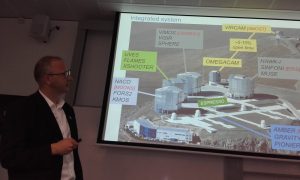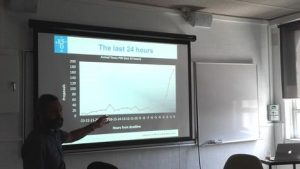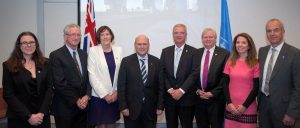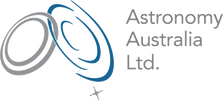See below for a summary of ESO-related news and events of particular relevance to the Australian user community.
In anticipation of the Period 114 proposal deadline on 21 March 2024, AAL and Australia’s ESO Scientific Technical Committee and Users Committee representatives (Michael Murphy and Sarah Sweet, respectively) organised an on-line ESO proposal writing workshop held on Thursday 7 March 2024. For the program and copies of the presentations slides, please visit the workshop web page.
In anticipation of the Period 111 proposal deadline at the end of September, AAL and Australia’s ESO Scientific Technical Committee and Users Committee representatives (Michael Murphy and Sarah Sweet, respectively) organised an on-line ESO proposal writing workshop held on Thursday 8 Sep 2022. For the program and copies of the presentations slides, please visit the workshop web page.
Following on from the BlueMUSE Science Workshop on Nov 9-10 2020, AAO-Macquarie is organising the 1st Australian BlueMUSE Workshop on Wednesday 2 Dec 2020.
BlueMUSE is an instrument selected by ESO for its VLT2030 instrumental plan, with a Phase A starting no later than 2022. It is an optical seeing-limited, blue-optimised, medium spectral resolution, panoramic integral-field-spectrograph, to be installed on one of the telescopes of the VLT on Cerro Paranal (Chile). The project is an evolution of the technology used on the very successful MUSE instrument, but with a new and distinct science case.
This workshop aims at bringing together Australian researchers to discuss the key science cases in relation to the top-level requirements and capabilities of BlueMUSE. It is the mirror science workshop of the BlueMUSE Science Workshop. It is an opportunity to engage the community and push forward the BlueMUSE project.
The workshop program will include a few overview and invited talks but the large majority will be dedicated to individual contributions and scientific discussions. We are specifically seeking input from the community on science cases where BlueMUSE will have a strong impact due to its uniqueness.
****** Please, consider submitting a science talk about what BlueMUSE could do for you research before Nov 20th, although everyone is invited to attend. ******
The workshop will be held virtually over Zoom. There is no registration fee and no deadline for registration. Please, complete your registration submitting the Google Registration Form. The program will be released shortly after the abstract deadline.
ESO is organising the next La Silla Paranal Users Workshop as a series of online events. Part 1 will take place on Monday 7 and Tuesday 8 September 2020.
If you are a La Silla Paranal Observatory user and are interested in:
…then this is the workshop is for you! Further aspects on the various available instruments, the preparation of proposals and of the observations of the approved program will be dealt with in Part 2 and Part 3, foreseen to happen in 2021.
ESO Workshop – Part 1
Part 1 of the ESO Workshop series will provide the chance for users to have hands-on experience on topics of their choice, including but not restricted to:
For this, participants are invited at registration to indicate areas of the program (preferred instruments, tools usage, etc.) they would like to further explore. Participants will then be split in groups, according to interest, or be provided with one-to-one sessions on a best-efforts basis.
Each day will contain a couple of hours of presentations by videoconference, starting at the (not completely unreasonable) time of 10pm Sydney time, 8pm Perth time. This will be accompanied by an hour or so of “Bring Your Own Problem” time for face-to-face support with ESO data reduction.
How to register for Part 1
Registration is free, but closes on 31 August 2020. Please visit the workshop home page for more information and a link to the Program. This is a unique opportunity to participate in an ESO workshop that is set up for fully remote participation, without the expectation of travel to ESO Headquarters.
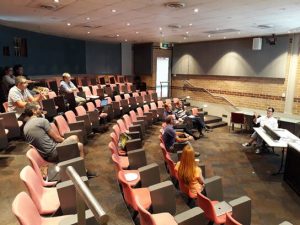
There are a couple of meetings taking place at ESO Garching in mid-2019 that are likely to be of interest to the Australian community:
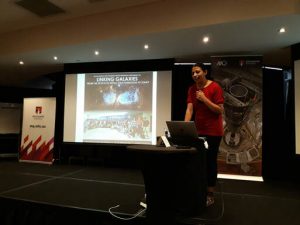
Two partners in the Australian Astronomical Optics (AAO) consortium – The Australian National University (ANU, AAO-Stromlo) and Macquarie University (AAO-MQ) – will lead the design phase of a new A$32 million adaptive optics system, called MAVIS (MCAO Assisted Visible Imager and Spectrograph) for UT4 of ESO’s Very Large Telescope in Chile. Associate Professor Francois Rigaut, the Adaptive Optics Principal Scientist at ANU who is leading the international consortium, said the upgraded telescope would revolutionise ground-based optical astronomy and allow astronomers to see “sharper than the James Webb Space Telescope, and deeper than the Hubble Space Telescope”.
The 15-month design study – which will involve the Italian National Institute for Astrophysics and the Laboratoire d’Astrophysique de Marseille in France, with ONERA (France) as an associated partner – will start in February 2019. The upgraded telescope is expected to be completed by 2025. A major part of the reward for the successful completion of the MAVIS project would be guaranteed nights of observation for the Australian astronomy community and project partners: 150 nights on the Very Large Telescope with MAVIS, which is equivalent in value to about $AU20 million. “ESO will add a contribution of A$12 million for the hardware, bringing the total value of the MAVIS adaptive-optics instrument to about A$32 million,” A/Prof. Rigaut said.
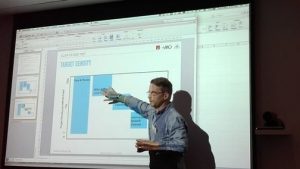
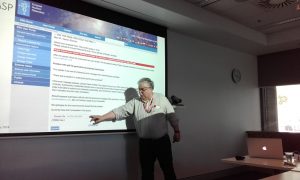
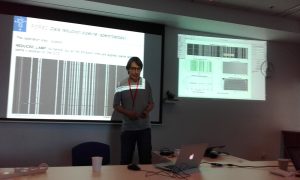
ESO held a La Silla Paranal Users Workshop on “Getting science done with your observatory” in Garching from 12-14 March 2018. This workshop featured overviews of the available instruments, the processes at work in ESO from proposal submission to data reduction, and accessing observations from the Science Archive. There were also hands-on tutorials in the use of ESO’s data reduction pipelines.
In order to engage with the large number of interested Australian users who were unable to travel to ESO Headquarters for this event, the AAO’s International Telescopes Support Office arranged for videoconference participation and recording of presentations using Zoom. Copies of the slide presentations as well as these recordings are available from the Workshop program page.
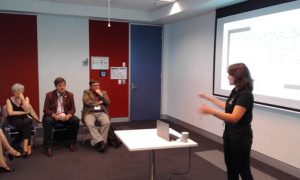
Monday 18 Sep 2017: AAO, Sydney
Tuesday 19 Sep 2017: RSAA Mt Stromlo, Canberra
Wednesday 20 Sep 2017: Swinburne University, Melbourne
Thursday 21 Sep 2017: University of Western Australia, Perth
Friday 22 Sep 2017: University of Queensland, Brisbane
